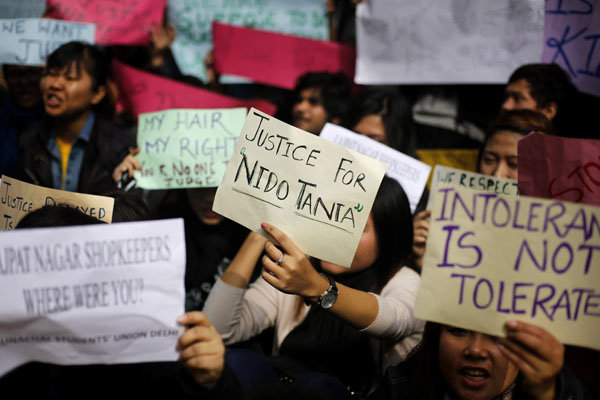The beating and death of a university student from the northeast has caused four days of protests. Prominent politicians are pledging support.
NEW DELHI — Students from India’s remote northeast are attracting high-profile politicians to their cause as they protest against what they say is widespread racism.
Holding signs reading “Why are we treated like outsiders?” and “We are Indians, too,” several hundred students have been chanting and sitting in silent protest for four days in downtown New Delhi to demand the creation of an anti-racism law.
The protests were sparked by the beating and death last week of Nido Taniam, a first-year university student from the northeast. The case has received widespread attention in the Indian media and underscores the divides that still permeate India as it heads into national elections this spring.
Among the politicians who have visited the protesters are Arvind Kejriwal, New Delhi’s new chief minister and head of the surging anti-corruption Aam Aadmi Party, and Rahul Gandhi, a leading Congress Party politician and heir to the Nehru-Gandhi political dynasty that has ruled India for most of its independence.
“Nido’s fight isn’t a northeastern issue. It’s a national issue,” Mr. Kejriwal told the crowd today. He also pledged to hang whoever is guilty.
Mr. Gandhi spoke at the protests last night, saying that what happened to Nido is “totally unacceptable” and that “there is only one India.… We are going to ensure you get respect in this country.”
Mr. Taniam, who was studying in Punjab, was vacationing in Delhi when he was beaten up with rods and sticks, allegedly by a group of shopkeepers in a South Delhi market who ridiculed his appearance and his dyed hair. Police say they negotiated a settlement between the parties, and that Nido then went to his sister’s home where he was found dead in his bed the next day.
The preliminary autopsy report has confirmed that he died of internal injuries suffered in a “violent assault.”
The prime minister and the minister of home affairs have condemned the attack on Nido and promised a probe into the matter. The principal opposition party, Bharatiya Janata Party, says it will raise the issue in parliament.
Yeshi Wangchu Kharma, vice president of a student union in Delhi that represents students from the northeast, says that the protesters are demanding an anti-racism law to ensure the safety of “all northeastern persons in this country” and an independent commission to investigate the incident.
According to the Delhi Police, six suspects are in police custody. Three of them have been arrested and two of the other three are juveniles. Police have launched a search for three remaining suspects.
Taniam is the son of a legislator from the northeastern state of Arunachal Pradesh. His friends and family have alleged that he was beaten twice by the group of accused attackers and that the second round of beating took place in the presence of the police. Police refute that allegation and claim that they have enough evidence to prove that Taniam was fine when he left for his sister’s house.
Inconsistencies in the police records and the statements of his friends and family have left some observers unconvinced that this incident was actually a racist assault.
“The details of the incident were sketchy and based on what one heard from eyewitnesses, the story looks like a street fight which turned ugly,” says Kishalay Bhattacharjee, who has written a book on Manipur, one of the states of northeastern India.
Geographic isolation
Northeast India is geographically isolated from the rest of mainland India. The seven northeastern states are almost completely cut off from the rest of India by Bangladesh. The northeastern states are bordered by Tibet, Nepal, Myanmar, and China, with whom northeastern Indians often have closer ethnic and linguistic ties.
The alienation is also cultural and social, says Binalakshmi Nepram, an activist from Manipur who was present at the Delhi protests. “The northeast is not included in the history curriculum of India, the media ignores stories from the northeast unless they are of violence and unrest, and the politicians show step-motherly treatment towards the region,” she says.
Mr. Bhattacharjee warns that racism cuts both ways in the northeast. He says that there has been evidence of discrimination against “outsiders” within the northeast and that Hindi-speaking people are routinely targeted in Manipur.
“While racist discrimination in this case should be protested, racism in the northeast against people from other parts of the country should also be protested,” he says.
Published in: Christian Science Monitor
Published on: February 4, 2014
Link: https://www.csmonitor.com/World/Asia-South-Central/2014/0204/Students-protest-against-racial-profiling-in-India


